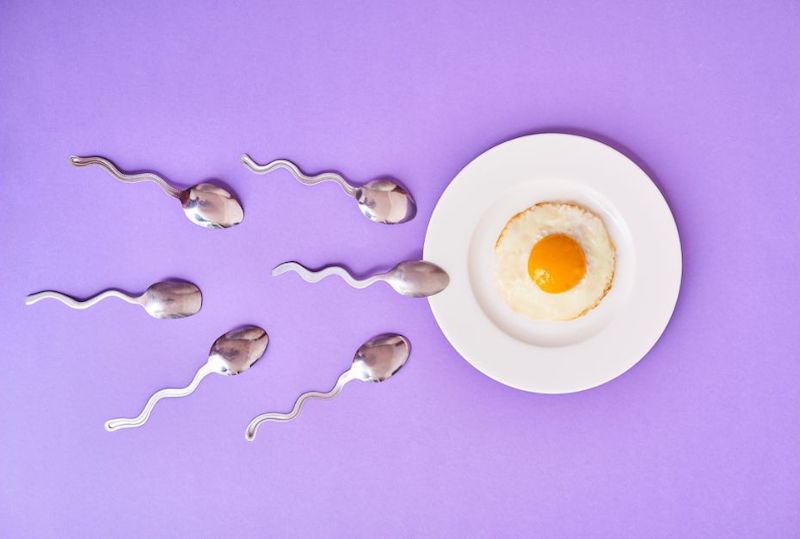Eat Your Way To Fertility With These Delicious Foods
Experts in the field have long recognized the connection between diet and fertility. It is well-known that a balanced diet plays a crucial role in overall health, but it also significantly impacts fertility. Our foods provide the necessary nutrients for our bodies to function correctly, including reproductive health. Learn about the top 6 foods that can boost fertility.
A balanced diet is essential for fertility because it provides the body with the necessary nutrients to support reproductive health. When our bodies lack certain nutrients, it can lead to hormonal imbalances, irregular menstrual cycles, and decreased fertility. On the other hand, a diet that is rich in nutrients can help regulate hormones, improve egg quality, and boost the possibility of conception.
Getting enough vitamins and minerals is particularly important for fertility. Specific vitamins and minerals, such as iron, folate, and zinc, play a crucial role in reproductive health. Folate is essential for developing a healthy fetus and can help prevent congenital disabilities. Iron is requisite to produce healthy red blood cells for carrying oxygen to the reproductive organs. Zinc is involved in hormone production and can help regulate menstrual cycles.
Maintaining a healthy BMI is also crucial for fertility. Being overweight or underweight can interfere with hormonal balance and disrupt ovulation. Women with low BMIs may have irregular menstrual cycles or not ovulate. On the other hand, women who are overweight may have higher levels of estrogen, which can interfere with ovulation. Achieving and maintaining an optimal weight through a balanced diet can help improve fertility.

Top 6 Foods for Boosting Fertility
Now that we understand the importance of a balanced diet for fertility let's explore the top 10 foods that can boost fertility. These foods are nutrient-dense and can help improve overall health, enhancing fertility.
- Leafy Greens: Kale, spinach, and Swiss chard contain essential vitamins and minerals for fertility. They are rich in folate, iron, and calcium, all important for reproductive health. Leafy greens also contain antioxidants that can help shield the eggs and sperm from damage.
- Berries: Strawberries, blueberries, and raspberries are delicious and plentiful for fertility. They are rich in antioxidants, particularly vitamins C and E, which can help improve egg quality and sperm health. Berries also deliver fiber, which can help regulate blood sugar levels and promote hormonal balance.
- Seeds and Nuts: Seeds and Nuts are a nutrient-dense addition to your diet and can provide a wide range of benefits for fertility. They are rich in good fats, fiber, and protein, which can help regulate hormones and promote ovulation. Nuts and seeds also contain antioxidants and other nutrients that can improve egg quality and sperm health.
- Whole Grains: Quinoa, brown rice, and oats contain complex carbohydrates, which work to regulate blood sugar levels and promote hormonal balance. They are also rich in vitamins, minerals, and fiber, necessary for reproductive health. Whole grains can help improve egg quality and increase the chances of conception.
- Protein: Protein is essential for fertility because it provides the building blocks for hormones and reproductive tissues. Lean proteins such as fish, tofu, and chicken benefit fertility. They are low in saturated fat and high in essential amino acids that can support reproductive health.
- Healthy Fats: Healthy fats such as avocados, fatty fish, and olive oil are important for fertility because they help regulate hormones and promote ovulation. They are saturated in omega-3 fatty acids, which can improve egg quality and sperm health.
Leafy Greens: A Fertility Powerhouse Food
Leafy greens are a fertility powerhouse because they contain essential nutrients that can improve reproductive health. They are rich in folate, vital for developing a healthy fetus and preventing congenital disabilities. Leafy greens are also a great source of iron necessary to produce healthy red blood cells. Iron deficiency can lead to anemia, interfering with ovulation and fertility.
In addition to folate and iron, leafy greens are also rich in calcium, which is good for reproductive health. Calcium is a vital part of muscle function, including the uterus muscles. It can help regulate menstrual cycles and promote regular ovulation. Leafy greens also contain antioxidants such as vitamins E and C, which can help shield the eggs and sperm from damage.
Including leafy greens in your diet is easy and can be done in various ways. You can add them to salads, stir-fries, smoothies, or even make them the star of a dish. Spinach, kale, Swiss chard, and collard greens are all excellent choices.
The Benefits of Berries for Fertility
Berries are not only delicious but also beneficial to fertility. They are rich in antioxidants, vitamins C and E, and minerals, which can help improve egg quality and sperm health. Antioxidants help protect the eggs and sperm from impairment caused by environmental toxins and free radicals, which can lead to DNA damage and decrease fertility. Chronic inflammation in the body can negatively impact fertility. Berries contain anti-inflammatory compounds that can help reduce inflammation and promote a healthy reproductive system. Berries contain essential nutrients like folate, which is crucial for preventing neural tube defects in early pregnancy.
Berries contain phytoestrogens, which are plant compounds that mimic the effects of estrogen in the body. These compounds can help regulate hormonal balance.
In addition to these benefits, berries are also a great source of fiber. Fiber benefits fertility because it can help regulate blood sugar levels and promote hormonal balance. High blood sugar levels can interfere with ovulation and decrease fertility.
Berries have a low glycemic index, meaning they do not cause a rapid increase in blood sugar levels. Stable blood sugar is essential for maintaining hormonal balance and supporting fertility.
Seeds and Nuts: A Nutrient-Dense Fertility Boosting Food
Nuts and seeds are a nutrient-dense addition to your diet and can offer a wide range of benefits for fertility. They acquire healthy fats, protein, and fiber, which can help regulate hormones and promote ovulation. Nuts and seeds also contain antioxidants and other nutrients that can improve egg quality and sperm health.
Healthy fats are essential for fertility because they help regulate hormones and promote ovulation. Nuts and seeds include omega-3 fatty acids, making them a great source of healthy fats. Omega-3 fatty acids benefit reproductive health and can improve egg quality and sperm health.
In addition to healthy fats, seeds, and nuts are also a great source of protein. Protein is essential for fertility because it provides the building blocks for hormones and reproductive tissues.
Seeds and nuts can be enjoyed as a snack or added to meals. Walnuts, almonds, chia seeds, and flaxseeds are all excellent choices. Aim to include a handful of nuts or seeds in your diet every day to boost your fertility.
The Role of Whole Grains in Fertility
Whole grains are an important part of a balanced diet and can be crucial to fertility. They are a great source of complex carbohydrates, which can help balance blood sugar and promote hormonal balance. Whole grains are also rich in fiber, vitamins, and minerals necessary for reproductive health.
Complex carbohydrates are particularly beneficial for fertility because they digest slowly, which helps regulate blood sugar levels. High blood sugar levels can interfere with ovulation and decrease fertility. Including whole grains in your diet can help regulate blood sugar levels and increase the chances of conception.
The Power of Protein for Fertility
Protein is essential for fertility because it provides the building blocks for hormones and reproductive tissues. It produces eggs and sperm and plays a crucial role in reproductive health.
Lean proteins such as tofu, chicken, and fish benefit fertility. They are low in saturated fat and high in essential amino acids that can support reproductive health.
In addition to lean protein sources, dairy products such as whole milk, whole yogurt, and cheese are also excellent protein sources. They are rich in calcium crucial in muscle function, including the uterus muscles. It can help regulate menstrual cycles and promote regular ovulation.
You can add chicken or fish to salads, stir-fries, or soups. Tofu is excellent as a meat substitute in a variety of dishes. You may consume dairy products alone or as ingredients in recipes.
The Benefits of Healthy Fats for Fertility
Healthy fats help regulate hormones and promote ovulation. They produce hormones and play a crucial role in reproductive health. Avocados, fatty fish, and olive oil are all exceptional sources of healthy fats. Avocados contain monounsaturated fats, which can help regulate hormones and promote ovulation. Olive oil also contains monounsaturated fats and can help reduce inflammation. Fatty fish such as mackerel, salmon, and sardines all contain omega-3 fatty acids, which can improve egg quality and sperm health.
You can utilize olive or avocado oil as a salad dressing or a toast spread. Fatty fish can be grilled, baked, broiled, and served with vegetables.
Oysters are often considered an aphrodisiac and can boost fertility for several reasons. Oysters are one of the best sources of zinc, a mineral crucial to reproductive health. Zinc is essential for male testosterone production and helps regulate female hormone levels, promoting healthy ovulation.
Oysters contain high levels of amino acids, including D-aspartic acid and N-methyl-D-aspartate (NMDA), linked to increased male testosterone production. Higher testosterone levels can enhance sperm production and motility.
Oysters are an outstanding source of omega-3 fatty acids, associated with improved fertility in both men and women. Omega-3s help regulate hormone levels, reduce inflammation, and promote healthy reproductive function. They also contain various antioxidants like vitamin E, selenium, and zinc, which help protect reproductive cells from oxidative damage caused by free radicals. This protection can improve sperm quality and egg health.
Oysters contain high dopamine levels, a neurotransmitter associated with pleasure and arousal. Increased dopamine levels can enhance sexual desire and improve overall sexual function.
Consuming Foods To Boost Fertility
It's important to note that while the foods described in this list may have potential benefits for fertility, they should not be relied upon as the sole solution for fertility issues. Maintaining a healthy diet, regular exercise, managing stress levels, and seeking medical advice are crucial for optimizing fertility.
- Protecting Your Health: Choosing A Sperm Bank Over Natural Insemination
- Hatching a Plan: Learning The Basics About Assisted Hatching in IVF
- Navigating GYN Surgery Before Artificial Insemination
- PGT Testing and Its Role in IVF Treatment
- The Ultimate Guide To Where You Can Donate Sperm In All 50 States

